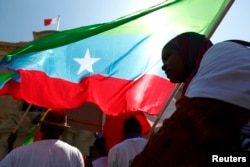The Ethiopian government has canceled plans to set up a new economic zone around the capital, the state broadcaster said Wednesday, after weeks of protests against the move that opponents said would displace farmers.
A government master plan to create the zone in the Oromiya region around Addis Ababa had sparked some of the worst civil unrest in Ethiopia in a decade and highlighted challenges facing the nation as it seeks to industrialize its agrarian economy.
Some opposition figures said in December about 90 people were killed, while others said the toll was now much higher. There was no official toll. The government blamed the violence on "armed gangs." Opponents blamed heavy-handed police tactics.
The Oromo People Democratic Organization (OPDO), the regional party that is part of the EPRDF coalition that rules the Horn of Africa country, decided to scrap the plan after a three-day meeting, the state broadcaster announced.
"A decision has been made to fully annul the disputed master plan," it said, citing a statement from the party, adding the decision followed public consultations.
‘Tip of iceberg’
Under the government's 25-year plan, land in the Oromiya region around Addis Ababa was to become part of a zone with new infrastructure to attract investment.
The government has worked on the development plan for several years, sparking some small protests in 2014. But when it emerged in mid-November last year that land was to be leased near Ginchi, a town in the area, bigger protests erupted.
Demonstrators, many of them students who joined farmers, regularly clashed with police after that.
On Tuesday, before the decision to scrap the plan was announced, Merera Gudina, chairman of the opposition Oromo Federalist Congress, said protests had subsided but that at least two people were killed and others arrested in recent days.
Merera also suggested some of the protesters were angry about more than simply the master plan, including the May election when no opposition candidates won a seat in parliament.
"The protests are only the tip of the iceberg. It is all down to frustration and anger over a range of issues," he said.
Rights groups and Western governments have praised Ethiopia for its success in developing a nation once brought to its knees by famine, but also criticize the authorities for clamping down on opponents. The government insists it allows free expression.






